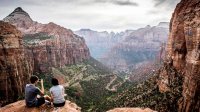Celebrate National Park Centennial With a Project
For teachers who want to start the year on a celebratory note, here’s an idea that’s rich with possibilities.
“Does a project always have to be about a problem? Can’t it be about something worth celebrating?” When a teacher asked me that question this summer during a project-based learning (PBL) workshop, she got me thinking. When I brainstorm with teachers about project ideas, I tend to think first of topics that give students a chance to solve an interesting challenge or advocate for a solution to a problem that concerns them. I encourage teachers to look for projects that will give students opportunities to put their problem-solving and critical-thinking skills to work. Often, that means wrestling with problems.
But PBL can also open opportunities to shine a light on people or places worth celebrating. Projects can give students a chance to highlight the heroes in their own lives, share the stories of unsung heroes in their communities, or honor their heritage. The challenge is finding a topic that’s meaningful for students and also connects to the big ideas of your content area.
A Ripe Teaching Opportunity
For teachers who want to start the year on a celebratory note, here’s an idea that’s rich with possibilities. This year marks the centennial of the National Park Service, an agency that focuses on issues ranging from historic preservation to archaeology, ecology to wildlife management, and education to public safety.
Content connections are as vast as the parks themselves, including American history, art, government, biology, environmental science, and nature writing -- just to name a few. And imagine the experts your students might connect with in person or via a Skype video conference or Google Hangout.
Classroom Questions
To jump-start your thinking, consider some of the questions this anniversary might generate. Here are a few possibilities:
- Is the preservation of these special places really America’s best idea, as historian Ken Burns suggests?
- How can we avoid loving our favorite parks to death?
- How have artists and photographers helped to preserve our favorite places?
- Where should the next national park go?
- Who will be the next generation of park advocates? (Along these lines, check out the Open Outdoors for Kids initiative from the National Park Foundation.)
Project Ideas
Depending on the direction your project takes, students might choose from a wide range of final products to demonstrate what they have learned in their investigations. During a conference session at ISTE earlier this year on PBL and technology, teachers suggested these park-worthy ideas:
- Storymaps to raise awareness of lesser known parks and monuments
- iBooks to capture students’ collective storytelling about park experiences (present day or historical)
- 3D maps of erosion on trails at heavily used parks
- Public service announcements about park safety
- Urban walking tours of NPS monuments and landmarks (including the newest National Historic Landmark: Stonewall Inn in New York City)
Events to commemorate the centennial will continue throughout the year. To find out what’s happening at parks across the country -- or in your backyard -- set up a Google alert for “National Park Service Centennial.” And watch the project possibilities flood your inbox.
Please share your project ideas and resources in the comment section below. Let’s see if we can generate more PBL ideas worth celebrating.
